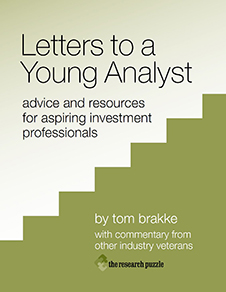
- Thursday, September 3rd, 2015
- process under pressure
-
The headlines are back. The volatility is back. What do you suppose your asset managers are doing right now?
It’s worth remembering that all organizations are messy and no process works like it’s diagrammed in the pitchbook. When the pressure is on, stresses and strains can manifest themselves in new ways (or distressingly similar old ways).
Some things to consider:
~ If “a business is only as good as its conversations,”the research puzzle | The phrase, which I use a lot, came from Hugh MacLeod. then the quality of those interactions is especially important during times of flux, when they can change in tone, in content, and in the amount of time spent going in circles. Communication problems can be exacerbated.
~ Personality traits that have been hidden during good times might reappear when the pressure does. Leaders can get controlling, shut down debate, and marginalize those with differential information, just at the time that their observations and insights are needed most. “Red Xs”Focus Consulting | This PDF from Focus Consulting defines a “Red X” and offers ideas on how to handle them. can create havoc, especially if the changes give them the opportunity to be in I-told-you-so mode.
~ Key relationships can fray. Those previously in agreement on important issues can suddenly be at odds, and feuds that were simmering before can erupt into a boil.
~ For most, the calculus of incentives has changed. There are only four months left in the calendar year, and the market volatility has caused abrupt moves in relative and absolute performance. Expect behavior to morph in response. (After all, the incentives are there to affect behavior, aren’t they?)
~ Previous “stakes in the ground” can mark a course that’s no longer wise. This is especially a risk for firms and individuals who are outspoken about their views in the media and/or who have carefully honed an investment theme and are known by it. If it’s time to back away, those stakes can impede the retreat. (The same is true for portfolio positions to which analysts and portfolio managers have become wedded.)
~ We never truly know how much the apparent lessons of one period transfer to another. We had been enjoying a period that Jim Grant has called “the Great Sedation.”Institutional Imperative | That and other interesting observations can be found in this video. A move away from that may change the landscape much more dramatically than we realize. And, as Michael Mauboussin points out, we might have misconstrued the environment to begin with: “When a mind seeking links between cause and effect meets a system that conceals them, accidents will happen.”Farnam Street | Shane Parrish quotes Mauboussin from Think Twice: Harnessing the Power of Counterintuition.
~ Speaking of accidents waiting to happen, a firm or an individual might be facing a make-or-break moment. Think about what that would mean for each of the considerations mentioned above.
~ Money is going to flow, from manager to manager and strategy to strategy. (Witness the articles already about who has done well and who has done poorly — and what has worked and what hasn’t.) That will cause prices to move in ways that seem unreasonable — and will disrupt the status quo at many organizations.
~ Remember, “everything is connected.”the research puzzle | This is a popular posting from 2012 with that title. It’s not just the investment process that comes under pressure at a time like this, it’s the whole organization, parts of which then put more pressure on the process itself. For example, marketing and client service demands can increase in magnitude — and at times distort the investment debate. Disputed valuations of positions can cause disagreements between investment and operations/compliance/legal staff. And technology problems may arise, with internal systems or external ones.Mutual Fund Directors Forum | Here is one example among many that have plagued the industry of late.
Market stress magnifies organizational stress and weaknesses are revealed. This is a time of discovery. For the asset managers that act as your agents — and for you.
How will you make the most of it?
